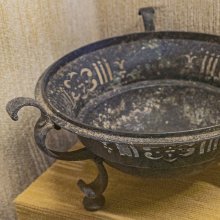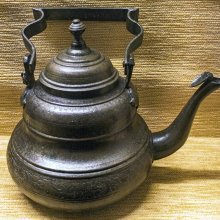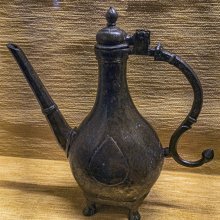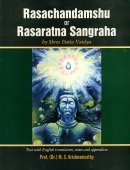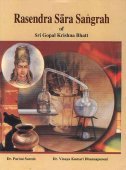Pittala: 15 definitions
Introduction:
Pittala means something in Hinduism, Sanskrit, Marathi, Jainism, Prakrit. If you want to know the exact meaning, history, etymology or English translation of this term then check out the descriptions on this page. Add your comment or reference to a book if you want to contribute to this summary article.
Images (photo gallery)
(+9 more images available)
In Hinduism
Ayurveda (science of life)
Rasashastra (Alchemy and Herbo-Mineral preparations)
Source: Wisdom Library: Rasa-śāstraPittala (पित्तल, “Brass”) is the name for a variation of ‘metal’ (dhātu/loha) from the sub-group named Miśraloha, according to the Rasaprakāśasudhākara: a 13th century Sanskrit book on Indian alchemy, or, Rasaśāstra.
Brass has the following two variations:
- Rītikā,
- Kākatuṇḍī.
Pittala (‘brass’) is of two types:
- Rītikā
- and Kākatuṇḍī.
That which turns on heating and quenching in tuṣajala (dhānyaāmla-an acidic liquid) is known as ṛtikā, and which turns black on heating and quenching in kāñjika is known as kākatuṇḍi.
Which looks yellowish, soft, heavy and like asāra (iron), golden yellow in colour, smooth and oily on touch is considered superior or acceptable for therapeutic uses. Which gives bad or foul smell, rough on touch, pāṇḍura (whitish) incolour, can not stand to hammering and has dry surface is considered inferior and not recommended for rasāyana purposes.
Ṛtikā is rūkṣa in guṇa, kṛmighne in karma and destroys raktapitta. Kākatuṇḍī is used in vīrya, sara in guṇa and kuṣṭhahara in karma .
Source: PMC: Therapeutic potentials of metals in ancient IndiaPittala is an important Misra Loha, an alloy of Copper and Zinc, known since the period of Samhita Kala. Charaka used this metal to prepare Vasti netra. It is known as Brass. As per the descriptions available in Rasa Ratna Samuchaya, there are two varieties of Pittala viz. Ritika and Kakatundi. Formulations of ‘Pittala’ are beneficial in diseases like Krimi, Kusta, Pandu etc.

Āyurveda (आयुर्वेद, ayurveda) is a branch of Indian science dealing with medicine, herbalism, taxology, anatomy, surgery, alchemy and related topics. Traditional practice of Āyurveda in ancient India dates back to at least the first millenium BC. Literature is commonly written in Sanskrit using various poetic metres.
Purana and Itihasa (epic history)
Source: Cologne Digital Sanskrit Dictionaries: The Purana IndexPittala (पित्तल).—A Janapada of the Ketumālā continent.*
- * Vāyu-purāṇa 44. 15.

The Purana (पुराण, purāṇas) refers to Sanskrit literature preserving ancient India’s vast cultural history, including historical legends, religious ceremonies, various arts and sciences. The eighteen mahapuranas total over 400,000 shlokas (metrical couplets) and date to at least several centuries BCE.
Languages of India and abroad
Marathi-English dictionary
Source: DDSA: The Molesworth Marathi and English Dictionarypittaḷa (पित्तळ).—a Commonly pittāḷū.
Marathi is an Indo-European language having over 70 million native speakers people in (predominantly) Maharashtra India. Marathi, like many other Indo-Aryan languages, evolved from early forms of Prakrit, which itself is a subset of Sanskrit, one of the most ancient languages of the world.
Sanskrit dictionary
Source: DDSA: The practical Sanskrit-English dictionaryPittala (पित्तल).—a. Bilious.
-lam 1 Brass.
2) A species of birch tree.
Source: Cologne Digital Sanskrit Dictionaries: Shabda-Sagara Sanskrit-English DictionaryPittala (पित्तल).—mfn.
(-laḥ-lā-laṃ) Bilious, relating to the bilious humour. n.
(-laṃ) 1. Brass. 2. The Bhurjapatra or Birch tree, of which the bark is used for writing upon, &c. f.
(-lā) A plant, (Jussieua repens.) E. pitta bile, lā to get, to resemble, (in colour,) aff. ḍa.
Source: Cologne Digital Sanskrit Dictionaries: Cappeller Sanskrit-English DictionaryPittala (पित्तल).—[adjective] bilious.
Source: Cologne Digital Sanskrit Dictionaries: Monier-Williams Sanskrit-English Dictionary1) Pittala (पित्तल):—[from pitta] mf(ā)n. bilious, secreting bile, [Suśruta] ([gana] sidhmādi)
2) Pittalā (पित्तला):—[from pittala > pitta] f. Jussiaea Repens, [cf. Lexicographers, esp. such as amarasiṃha, halāyudha, hemacandra, etc.]
3) Pittala (पित्तल):—[from pitta] n. brass, bell-metal, [cf. Lexicographers, esp. such as amarasiṃha, halāyudha, hemacandra, etc.]
4) [v.s. ...] Betula Bhojpatra (its bark is used for writing upon; cf. bhūrja-pattra), [cf. Lexicographers, esp. such as amarasiṃha, halāyudha, hemacandra, etc.]
Source: Cologne Digital Sanskrit Dictionaries: Yates Sanskrit-English DictionaryPittala (पित्तल):—[(laḥ-lā-laṃ) a.] Bilious n. Brass; the birch tree. f. A plant (Jussieua repens).
Source: DDSA: Paia-sadda-mahannavo; a comprehensive Prakrit Hindi dictionary (S)Pittala (पित्तल) in the Sanskrit language is related to the Prakrit word: Pittala.
[Sanskrit to German]
Sanskrit, also spelled संस्कृतम् (saṃskṛtam), is an ancient language of India commonly seen as the grandmother of the Indo-European language family (even English!). Closely allied with Prakrit and Pali, Sanskrit is more exhaustive in both grammar and terms and has the most extensive collection of literature in the world, greatly surpassing its sister-languages Greek and Latin.
Prakrit-English dictionary
Source: DDSA: Paia-sadda-mahannavo; a comprehensive Prakrit Hindi dictionaryPittala (पित्तल) in the Prakrit language is related to the Sanskrit word: Pittala.
Prakrit is an ancient language closely associated with both Pali and Sanskrit. Jain literature is often composed in this language or sub-dialects, such as the Agamas and their commentaries which are written in Ardhamagadhi and Maharashtri Prakrit. The earliest extant texts can be dated to as early as the 4th century BCE although core portions might be older.
Kannada-English dictionary
Source: Alar: Kannada-English corpusPittala (ಪಿತ್ತಲ):—[adjective] of, having or resulting from some ailment of the bile or the liver; bilious.
--- OR ---
Pittala (ಪಿತ್ತಲ):—
1) [noun] a yellowish metal that is essentially an alloy of copper and zinc; brass.
2) [noun] the colour of this.
3) [noun] (fig.) a pretending of what one is not, for purpose of cheating others; hypocrisy.
Kannada is a Dravidian language (as opposed to the Indo-European language family) mainly spoken in the southwestern region of India.
See also (Relevant definitions)
Starts with: Pittalabhumde, Pittalahara, Pittalaimalai, Pittalairekku, Pittalaiyatakam, Pittalam, Pittalata, Pittalatakam.
Ends with: Munipittala.
Full-text: Munipittala, Pitala, Paittala, Pittalam, Pittalata, Pitalata, Hamsalohaka, Munipittalam, Arakuta, Pittali, Vrikshamla, Mishraloha, Vartaloha, Ketumaladvipa, Dravya.
Relevant text
Search found 8 books and stories containing Pittala, Pittaḷa, Pittalā; (plurals include: Pittalas, Pittaḷas, Pittalās). You can also click to the full overview containing English textual excerpts. Below are direct links for the most relevant articles:
Rasa Jala Nidhi, vol 3: Metals, Gems and other substances (by Bhudeb Mookerjee)
Part 1 - Characteristics of Brass (pittala) < [Chapter VIII - Mixed metals (1): Pittala (brass)]
Chapter VIII - Mixed metals (1): Pittala (brass)
Part 3 - Incineration of pittala < [Chapter VIII - Mixed metals (1): Pittala (brass)]
Sushruta Samhita, Volume 6: Uttara-tantra (by Kaviraj Kunja Lal Bhishagratna)
Chapter XXXVIII - Treatment of the diseases of the female organ of generation < [Canto II - Kaumarabhritya-tantra (pediatrics, gynecology and pregnancy)]
Atharvaveda and Charaka Samhita (by Laxmi Maji)
4a. Kuṣṭha-roga (leprosy) in the Atharvaveda < [Chapter 5 - Diseases and Remedies in Atharvaveda and Caraka-Saṃhitā]
1a. Study of Fever (Takman) in the Atharvaveda < [Chapter 5 - Diseases and Remedies in Atharvaveda and Caraka-Saṃhitā]
Trishashti Shalaka Purusha Caritra (by Helen M. Johnson)
Appendix 5.2: new and rare words < [Appendices]
Appendix 1.6: New and rare words < [Appendices]
Amarakoshodghatana of Kshirasvamin (study) (by A. Yamuna Devi)
Economics (3): Goods of trade < [Chapter 3 - Social Aspects]
A History of Indian Philosophy Volume 2 (by Surendranath Dasgupta)
Part 8 - Vāyu, Pitta and Kapha < [Chapter XIII - Speculations in the Medical Schools]
Related products

